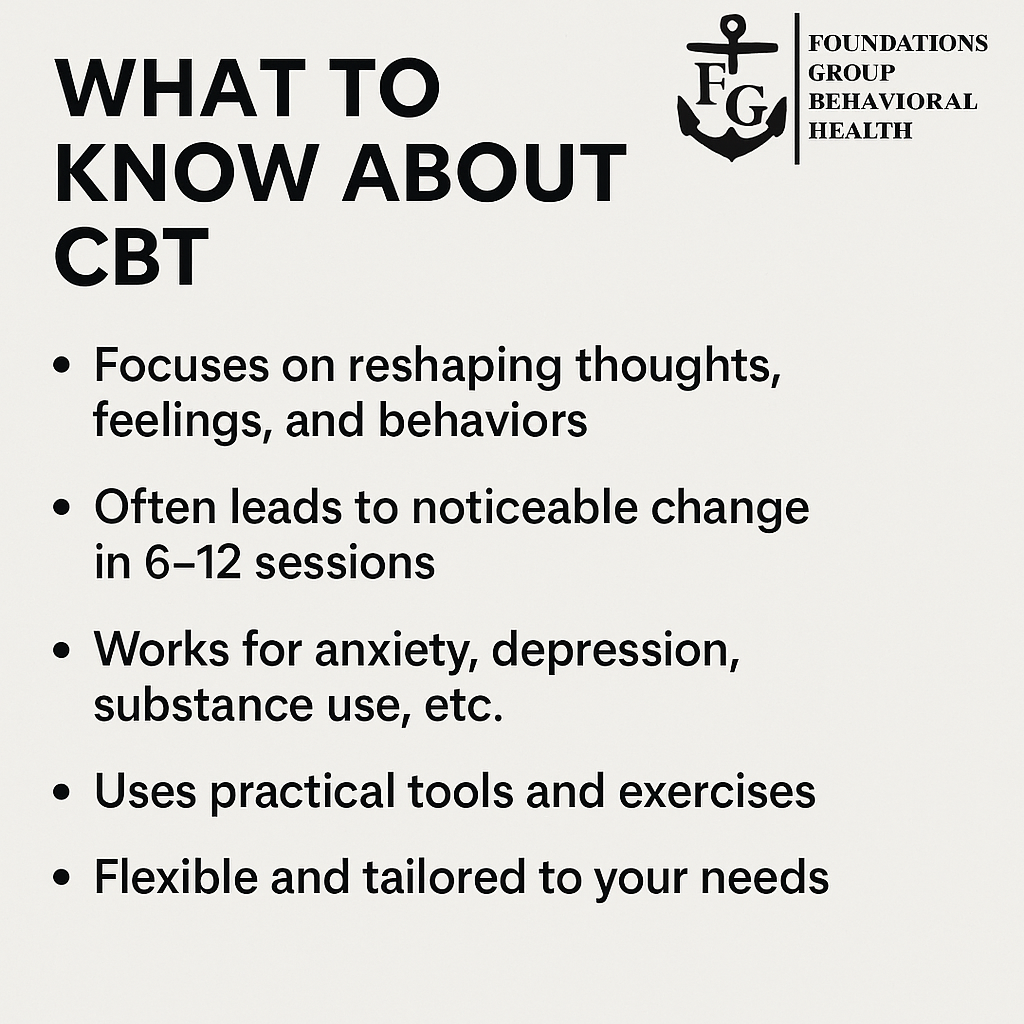Stepping into therapy for the first time can feel like you’re venturing into a foreign land. Apps, friends, even Google might point you toward CBT, or Cognitive Behavioral Therapy—but you may still be asking: What is it? Will it help me? Do I even need it?
If you’re sober-curious, managing anxiety, or simply searching for a bit more ease in your day-to-day, Cognitive Behavioral Therapy in Massachusetts is often a good place to start. It’s structured yet flexible, evidence-based but not clinical-feeling, and—most importantly—it helps people feel more confident handling their inner lives.
At Foundations Group Behavioral Health in Massachusetts, CBT is one of the first tools we offer because it works–and it feels like something you can actually use in real life. Here’s a deeper look into what CBT is, why it’s popular, how it goes, and what happens next.
1. What Exactly Is Cognitive Behavioral Therapy?
At its core, CBT is a practical, skills-based form of therapy that helps you understand how your thoughts affect your feelings and behavior.
- Cognitive refers to how you think: your self-talk, interpretations, and beliefs.
- Behavioral refers to what you do: habits, avoidance, and actions that maintain or worsen emotional patterns.
- Therapy is the space where you safely explore, challenge, and reshape these elements.
The big idea? Thoughts shape feelings. Feelings shape actions. And you can learn to shift all three—toward something that makes life feel a bit kinder.
2. Why Do So Many Therapists Start With CBT?
CBT has stood the test of time for good reasons:
- Efficiency: It often brings relief in weeks, not years.
- Structure: You’ll have tools, exercises, and homework—something tangible to grasp.
- Flexibility: It’s adaptable for adults, teens, individuals, couples, teens, and more.
- Evidence-Based: It’s well-researched, with solid outcomes for anxiety, depression, OCD, trauma, substance use, and more.
- Empowerment: You learn to be your own therapist—inside your head and out in the world.
In short, CBT gives you a road map instead of just a mirror.
3. What Happens in a CBT Session?
If you’ve never tried therapy, here’s a preview:
• Building rapport – You’ll spend a few minutes talking about what brought you in, what you’re hoping for, and how the therapist can help.
• Identifying thoughts or beliefs – Narrowing in on patterns like “I’m not good enough” or “If I try, I’ll mess it up.”
• Exploring the connection – “When I think that way, I feel stuck, anxious, or demotivated.”
• Testing the beliefs – “Is that really always true? What could I say differently?”
• Practice exercises – Thought logs, behavior experiments, or mindfulness techniques to try between sessions.
It’s a gentle but active process—you’re not just talking, you’re learning and testing new perspectives.
4. How Long Does CBT Take?
Everyone’s journey is different, but CBT is often shorter-term:
- Many people notice changes in 6–12 sessions
- Others may continue for a few months to tackle deeper issues
- It’s customizable—if you need more time, you stay; if you feel ready, you wrap up
CBT isn’t about needing therapy forever—it’s about having therapy for now, until you’ve built tools to carry forward on your own.

5. What If CBT Doesn’t Feel Like “My Thing”?
That’s okay. CBT is a starting point—not a rule.
- If you find yourself diving into your past or relationships, your therapist might introduce other techniques (e.g., psychodynamic therapy, somatic work, dialectical tools).
- If you’re craving more structured or targeted support, some clients add group therapy, life coaching, or skills training.
- And if CBT feels too rigid or emotional too quickly, therapists can ease into it at your pace, or try different modalities altogether.
In our view, therapy isn’t a one-size-fits-all formula. It’s about finding what feels like progress—not just what’s “supposed to” help.
6. Real-Life Examples: How CBT Can Shift Moments
- Anxiety at work: If you think, “I’ll fail this presentation,” CBT can help you test that belief and build a rehearsal plan that feels doable.
- Low mood: If you’re stuck thinking, “I’m useless,” CBT might help you track small wins and rewire your sense of worth.
- Avoidance behaviors: If you’re avoiding social events, CBT offers graded exposure and skill practice—not all-or-nothing leaps.
- Substance cues: If after-work stress triggers cravings, CBT helps you notice, interrupt, and reframe the thought before the action.
These small shifts, applied repeatedly, build cumulative change—and normal life, not perfection.
Frequently Asked Questions (FAQs)
Q: Is CBT only for anxiety and depression?
A: No—CBT is also used for PTSD, OCD, phobias, insomnia, anger management, substance use, and even chronic pain coordination.
Q: Do I have to do homework?
A: Homework can feel like another task—but it’s optional, designed to help you practice between sessions. You’re collaborators, not pupils.
Q: What if I don’t know what I want help with?
A: That’s okay. Often people discover more as they start. A CBT therapist helps you identify patterns and define small, helpful goals.
Q: How long does a session usually last?
A: Most sessions are 45–60 minutes, weekly. At Foundations we tailor frequency and duration to what you need.
Q: Is it normal to feel worse before you feel better?
A: Yes. As you begin noticing thoughts you’ve ignored, emotions may rise. That’s part of the change process—and your therapist will support you every step of the way.
Ready to Give CBT a Try?
If you’re nervous, curious, motivated, or tired of feeling stuck, Foundations Group Behavioral Health in Massachusetts is here to help.
CBT isn’t magic—but it is a way to see yourself with more clarity and kindness, and to build tools you can use outside the therapy room.
Call (888) 685-9730 or visit Contact Us to take your first step.








